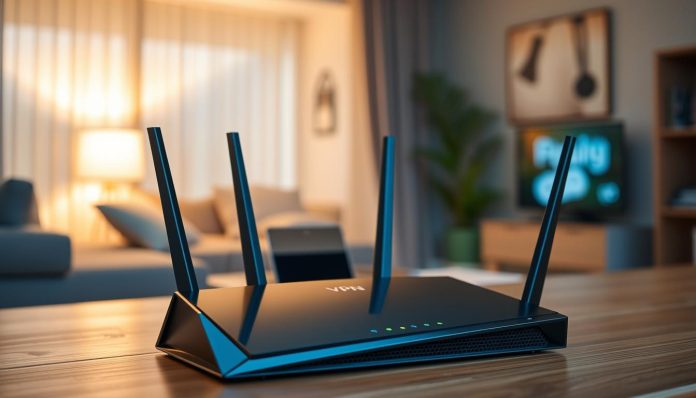A VPN router is like a regular router but with a VPN added. It lets many devices in your home connect to the VPN service safely. This makes your whole home network secure.
When you put a VPN on your router, all devices in your home stay safe. This includes smartphones, laptops, and smart TVs. It’s great for homes with lots of devices online, offering whole home protection easily.
Key Takeaways
- A VPN router is a regular router with a VPN installed.
- It provides comprehensive home network security.
- Multiple devices can connect to the VPN service securely.
- Whole home protection is achieved with minimal configuration.
- All devices connected to the router are protected.
What is a VPN Router?
For those looking to protect all their devices at home, a VPN router is the answer. A VPN router is designed to manage VPN connections. It allows multiple devices to connect to the internet securely.
Definition of VPN Routers
A VPN router is a device that connects to a VPN service. It encrypts your internet traffic and protects your online activities from being monitored or intercepted. It allows you to link several devices at the same time, whether through Wi-Fi or Ethernet. This ensures a secure internet connection for all your devices.
How VPN Routers Work
VPN routers work by establishing a VPN connection. This encrypts your internet traffic before it leaves your network. Whether you’re browsing, streaming, or gaming, your online activities are protected from potential threats.
The router then shares this secure connection with all devices connected to it. This provides a comprehensive security solution for your home network.
The benefits of using a VPN router include protecting multiple devices simultaneously. It provides a secure internet connection. This is particularly useful for households with many devices or for small businesses looking to secure their network.
Benefits of Using a VPN Router
Using a VPN router boosts your home network’s security and lets you access more online content. It connects all devices to a secure, encrypted link. This way, your whole network is protected.
Comprehensive Home Network Security
A VPN router keeps your home network safe by encrypting all internet traffic. It guards your data, no matter the device. This includes smart TVs, gaming consoles, and IoT devices.
Key Benefits:
- Protects multiple devices at once
- Makes sure all devices have encrypted connections
- Secures devices that can’t run VPN software
| Device Type | Security Feature | Benefit |
|---|---|---|
| Smart TVs | Encrypted Streaming | Secure Content Access |
| Gaming Consoles | Protected Online Gaming | Reduced Risk of DDoS Attacks |
| IoT Devices | Secure Data Transmission | Prevents Data Interception |
Bypassing Geographic Restrictions
A VPN router lets you get past geographic blocks. This means you can watch content that’s not available in your area. It’s great for streaming services and accessing content locked to other regions.
Enjoy your favorite shows and movies from anywhere in the world. With a VPN router, you can pretend to be in a different country. This lets you access content that’s not available to you.
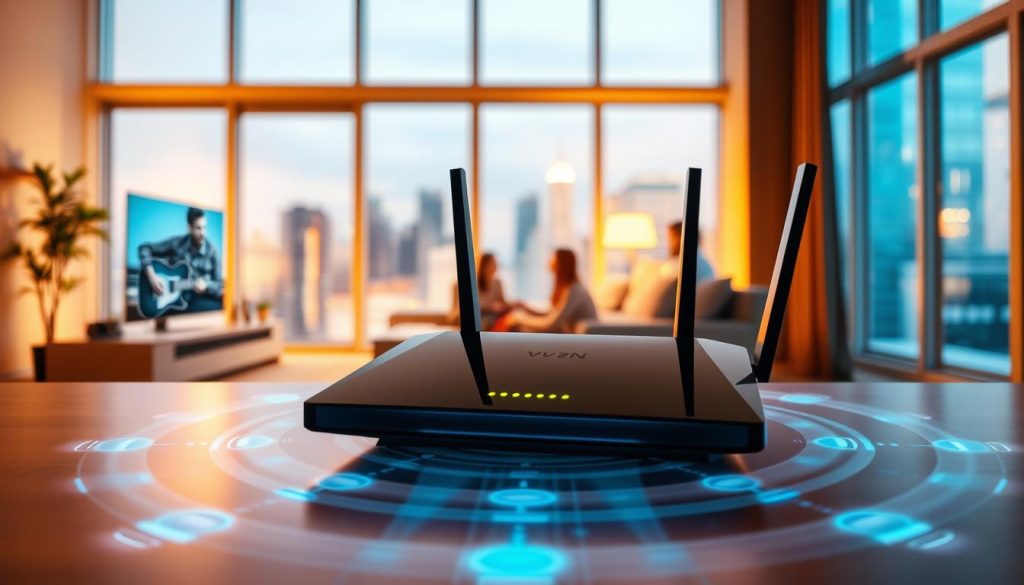
Using a VPN router makes your internet experience safer and more open. It’s perfect for keeping your network secure or for accessing content from other places. A VPN router is a smart choice for your devices.
Setting Up a VPN Router
Setting up a VPN router is simpler than you might think. It boosts your online security and keeps all devices on your network safe.
Choosing the Right Router
To start, pick a router that works with VPNs. Not every router can handle VPN settings. Look for ones with DD-WRT or OpenWRT firmware. Make sure to check the specs and reviews for compatibility.
Step-by-Step Setup Guide
After picking the right router, follow these steps:
- Sign up for a VPN service that supports router setups.
- Make sure your router is compatible with the VPN service.
- Use the VPN provider’s guide to set up the VPN on your router.
- Check that your VPN connection is working right.
Using a VPN router makes protecting your devices easy. It’s great for devices that can’t use VPNs, like smart TVs and gaming consoles.
Common Setup Challenges
Setting up a VPN router is usually easy, but you might face some hurdles. Common problems include:
- Keeping your router’s firmware updated.
- Setting up the VPN settings right.
- Fixing connection issues.
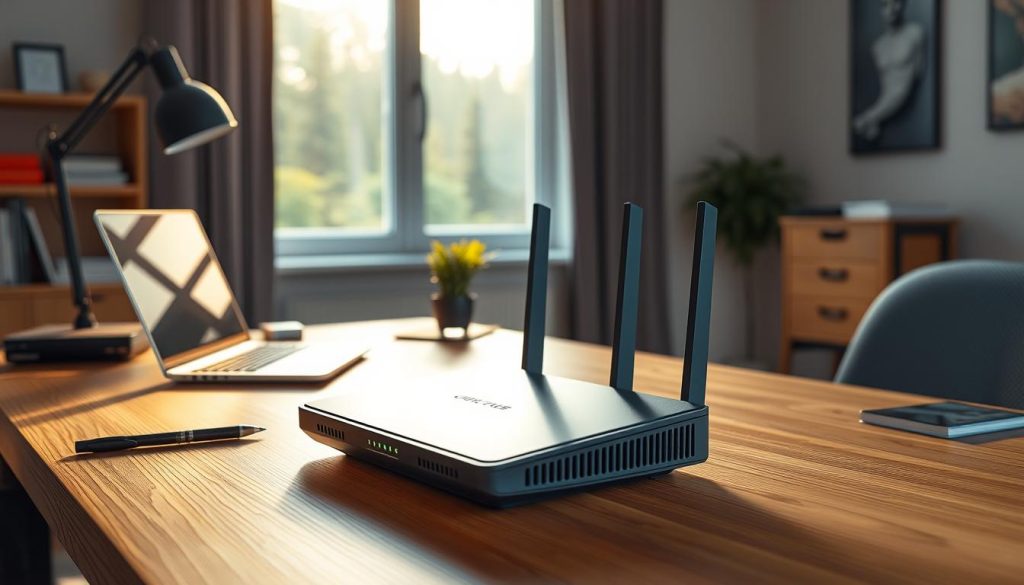
To solve these problems, check your VPN provider’s help and your router’s manual. Also, look at online forums and reviews for advice from others.
Best VPN Services for Routers
The best VPN services for routers combine strong encryption, ease of use, and reliable customer support. With a VPN router, all devices connected are protected. You don’t need to install VPN software on each device.
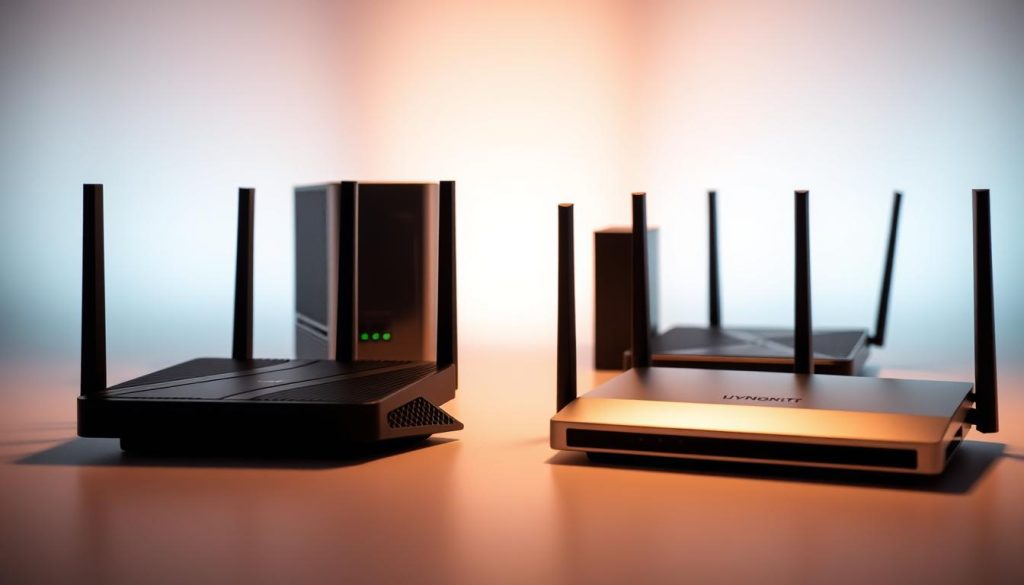
Top Recommendations for VPN Services
Top VPN services for routers include ExpressVPN, NordVPN, and Surfshark. They are known for working well with many routers, strong encryption, and easy-to-use interfaces.
ExpressVPN is known for its fast speeds and great customer support. NordVPN has a huge server network and advanced security. Surfshark is affordable and lets you connect unlimited devices.
Features to Look For in a VPN
When picking a VPN for your router, look for a few key features. Make sure the VPN works with your router’s firmware. This includes stock firmware or third-party solutions like DD-WRT or Tomato.
- Strong Encryption: Choose VPNs with strong encryption like OpenVPN or WireGuard.
- Reliable Customer Support: Go for VPNs with 24/7 support for setup or connectivity help.
- Server Network: A big server network means more options for avoiding geo-restrictions and less latency.
- Ease of Use: Pick VPNs with easy apps and simple setup processes.
By focusing on these features, you can find a VPN that secures your internet and improves your online experience.
Performance Considerations
A VPN router helps secure your home network. But, it’s important to think about how it affects your internet speed. Modern VPN routers are made to keep your connection fast and secure.
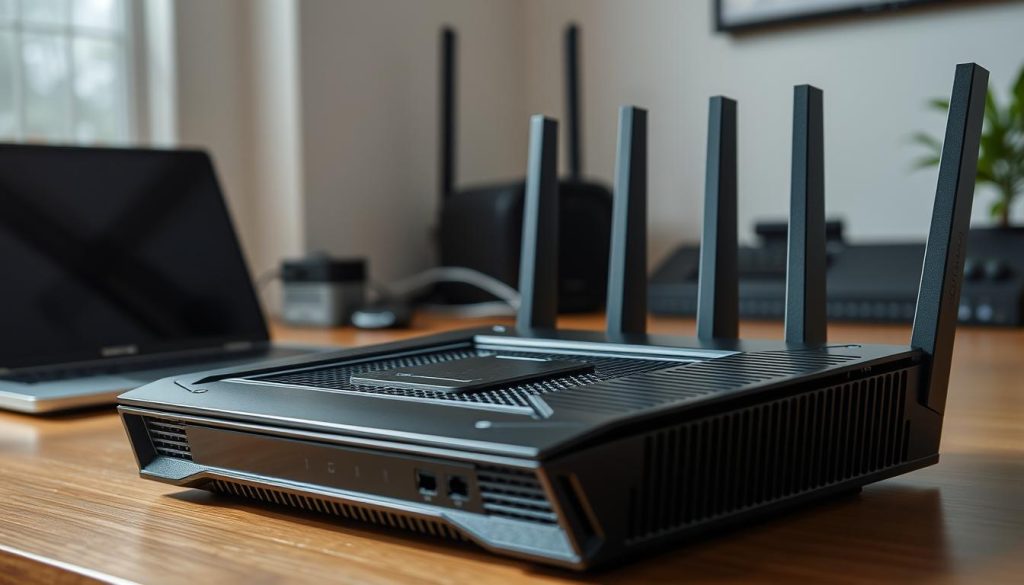
Impact on Internet Speed
Using a VPN router can slow down your internet. This slowdown depends on several things. Like the VPN protocol, your router’s quality, and your ISP’s speed.
Choosing a VPN service with high-speed protocols like WireGuard can help. Also, make sure your router can handle the encryption well.
Balancing Security and Performance
To find a good balance, consider these tips:
- Choose a VPN protocol that balances security and speed.
- Use Quality of Service (QoS) settings on your router to prioritize important apps.
- Keep your router’s firmware up to date for better performance.
- Pick a VPN service known for both performance and security.
By following these steps, you can get the VPN router benefits of a secure internet. This way, you keep your home network safe without slowing down your online activities. It’s all about finding that perfect balance.
Remember, the goal is to keep your network safe without losing speed. Paying attention to VPN router performance helps you achieve this balance. This ensures your home network stays secure and fast.
VPN Routers vs. Traditional VPN Applications
It’s important to know the differences between VPN routers and traditional VPN applications. Both have their own benefits and drawbacks. This knowledge helps you choose the best way to protect your internet connection.
Key Differences Explained
A VPN router protects all devices connected to it. This makes it a great choice for home network security. On the other hand, a traditional VPN application is installed on individual devices. It offers flexibility but needs to be set up on each device.
Setting up a VPN router can be more complex, especially when configuring the VPN connection. But, it protects all devices on the network without needing software on each one.
Pros and Cons of Each Solution
Now, let’s look at the pros and cons of using a VPN router versus a traditional VPN application:
- VPN Routers:
- Pros:
- Secures all connected devices
- No need to install VPN software on each device
- Cons:
- Setup can be complex
- Encryption might slow down your internet
- Pros:
- Flexibility to secure individual devices
- Easier to switch between different VPN servers or configurations
The choice between a VPN router and a traditional VPN application depends on your needs. If you want to secure your whole home network easily, a VPN router is a good choice. But, if you like the flexibility of securing individual devices, a traditional VPN application might be better.
Troubleshooting Common VPN Router Issues
If you’re having trouble with your VPN router, don’t worry. There are steps you can take to fix it. A VPN router is key to your home network’s security. So, it’s important to solve any problems quickly.
Frequent Connectivity Problems
One common issue is connectivity problems. This might mean you can’t connect to the VPN, or your connection drops. To fix this, try restarting your router. This often solves the problem.
If restarting doesn’t work, check your VPN settings. Make sure they’re set up right.
Another reason for connectivity issues is interference from other devices. Try to reduce this by connecting fewer devices to your router. Or, use a router with Quality of Service (QoS) settings to prioritize your VPN traffic.
Optimizing Router Performance
To keep your VPN router running well, make sure its firmware is up to date. Updates often bring performance boosts and fix bugs. You can also tweak your router’s settings to improve performance.
For example, change the Wi-Fi channel to a less crowded one. This can help your router work better.
Also, think about where you place your router. Putting it in a central spot in your home can help with coverage. A VPN router with a strong signal can also keep your connection stable.
By following these steps and optimizing your VPN router, you can ensure a secure and stable connection for your whole home network.
Enhancing Privacy with a VPN Router
A VPN router does more than just secure your internet. It also boosts your online privacy. It encrypts your internet traffic, keeping your online actions private and safe.
Data Encryption Explained
Data encryption is key to a VPN router’s work. It turns your internet traffic into a secret code. Only those with the right key can read it.
Encryption protocols differ, but the best use AES-256 encryption. This makes your data safe from prying eyes.
Keeping Your Online Activities Private
With a VPN router, your online life stays private, even on public Wi-Fi. This is crucial for homes with many devices online. It keeps all your activities safe.
- Your ISP can’t watch what you do online.
- Hackers and cybercriminals can’t get to your data.
- You can access content blocked in your area safely.
Using a VPN router is a big step towards better online privacy and security. It keeps your whole home network safe. Your internet stays secure, and your online actions stay private.
Future Trends in VPN Technology
VPN technology is getting better, and we’re excited about what’s coming. One big change is mesh networking with VPNs. This will make your home network safer and your online experience better.
Advancements in Mesh Networking
Mesh networking is changing how we connect to the internet. It combines VPN tech with mesh networking for a safer, more reliable connection at home. This is great for VPN router features, offering better coverage and performance.
Future Developments and Comparisons
VPN tech is getting better, and so are VPN router comparisons. Look for routers with strong encryption, easy setup, and good network compatibility. Staying up-to-date helps you choose the best VPN for your home network security.
